Piloting and evaluating drug checking services in Toronto, Ontario
The pilot for Toronto’s Drug Checking Service, which checked and publicly reported on more than 10,000 samples between October 10, 2019, and June 30, 2023, was coordinated by the CDPE. While Toronto’s Drug Checking Service now operates from its own unit within MAP Centre for Urban Health Solutions at St. Michael’s Hospital, a site of Unity Health Toronto, the CDPE continues to work collaboratively with and conduct scientific research on the program.
Project Contents
Overview
People who use drugs in Toronto have long advocated for access to drug checking in an effort to reduce the harms associated with using drugs from the unregulated supply. In collaboration with its partners, the CDPE was able to make that happen by acquiring funding to support the design and implementation of an offsite drug checking pilot program, which came to be known as Toronto’s Drug Checking Service.
Over the course of the pilot period, which ran from October 10, 2019, to June 30, 2023, more than 10,000 samples from Toronto’s unregulated drug supply were checked and over 450 unique drugs were identified – many of which can be directly linked to overdose. Service users, who submitted substance or used equipment samples to be checked, were provided with detailed information on the composition of their drugs, along with tailored strategies to reduce harm and referrals to drug-related, health, and social services via integrated community health agencies (Moss Park Consumption and Treatment Service, Parkdale Queen West Community Health Centre and the TRIP! Project, South Riverdale Community Health Centre, The Works at Toronto Public Health). Samples were analyzed by the clinical laboratories at the Centre for Addiction and Mental Health and St. Michael’s Hospital. Beyond educating individual service users, results for all samples were collated and analyzed to perform unregulated drug market monitoring, then translated and publicly disseminated every other week to communicate drug market trends to those who could not directly access the service, as well as to inform care for people who use drugs, advocacy, policy, and research.
Drug checking pilot programs in Toronto, across British Columbia, and elsewhere proved to have a positive and quantifiable impact on responding to Canada’s toxic drug supply crisis. For example, drug checking:
- Provides potentially life-saving information to those at highest risk of overdose
- Facilitates behaviour change that reduces the risk of overdose
- Provides a new gateway to accessing harm reduction services
- Provides the only source of real time monitoring and public dissemination of unregulated drug market trends
- Provides data that informs clinicians and care and improves health and social services
- Is valuable to people who use drugs, empowering them to advocate for themselves and help develop solutions that impact them
Toronto’s Drug Checking Service has become an international authority on drug checking service provision and unregulated drug market monitoring for opioid overdose prevention. The program, which has a provincial mandate in Ontario, now operates from its own unit within MAP Centre for Urban Health Solutions at St. Michael’s Hospital, a site of Unity Health Toronto. For more information, please visit www.drugchecking.community.
The CDPE continues to work collaboratively with Toronto’s Drug Checking Service and conduct scientific research on the program.
Financial Supporters
Health Canada | St. Michael’s Hospital Foundation
Partners
Alliance for Collaborative Drug Checking | British Columbia Centre of Substance Use | Canadian Centre on Substance Use and Addiction | Centre for Addiction and Mental Health | Health Canada’s Drug Analysis Service | Health Canada’s Office of Controlled Substances | Moss Park Consumption and Treatment Service | Office of the Chief Coroner for Ontario | Ontario Harm Reduction Network | Ontario Poison Centre | Parkdale Queen West Community Health Centre | Public Health Ontario | South Riverdale Community Health Centre | St. Michael’s Hospital, a site of Unity Health Toronto | Street Health | The Works at Toronto Public Health | Toronto Harm Reduction Alliance | Toronto Paramedic Services | Toronto Public Health | Trip! Project | Vancouver Island Drug Checking Project
Related Content
- Detecting and Responding to New Psychoactive Substances: Experiences of Frontline Health Services in Toronto, Ontario, Canada (UN Statement)
- Comparing Models of Drug Checking Services in Canada
Blog Posts:
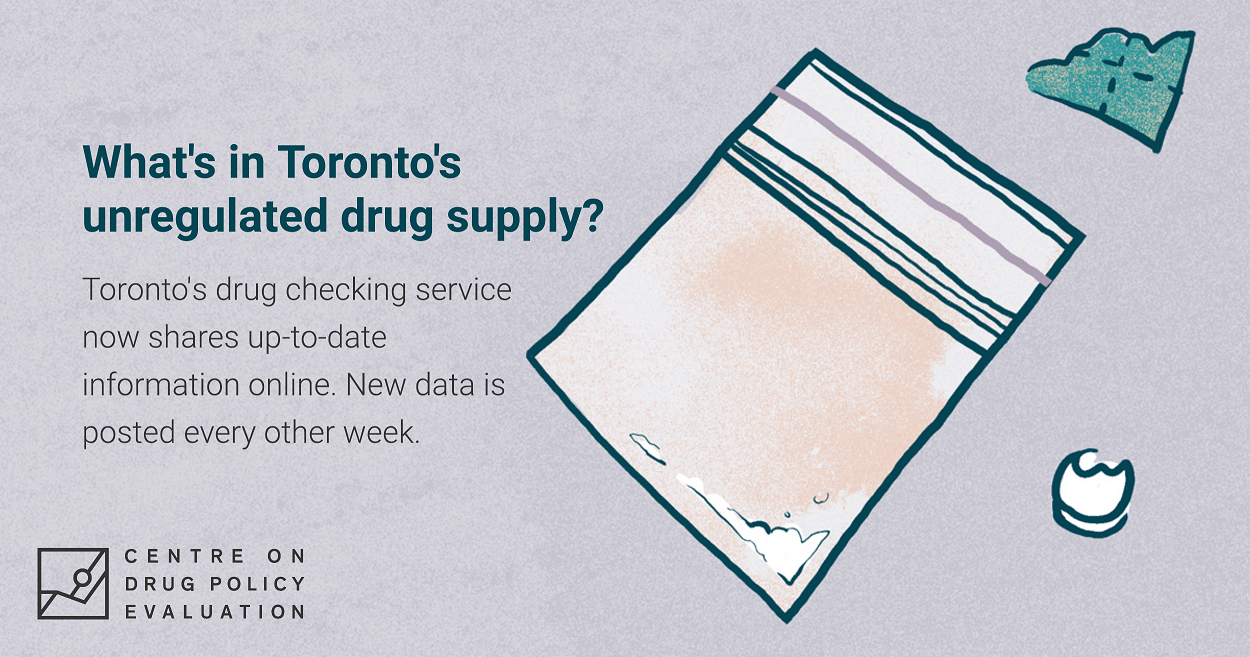
Toronto's Drug Checking Service Website
Toronto's drug checking service has launched an interactive website! We will now publicly share regular information on Toronto’s unregulated drug supply, supporting more evidence-based harm reduction practices, policy, research, and care for people who use drugs.
View
Drug Checking Technology Challenge
The CDPE’s smartphone-based portable drug checking device was one of three finalists for Health Canada’s drug checking technology challenge.
View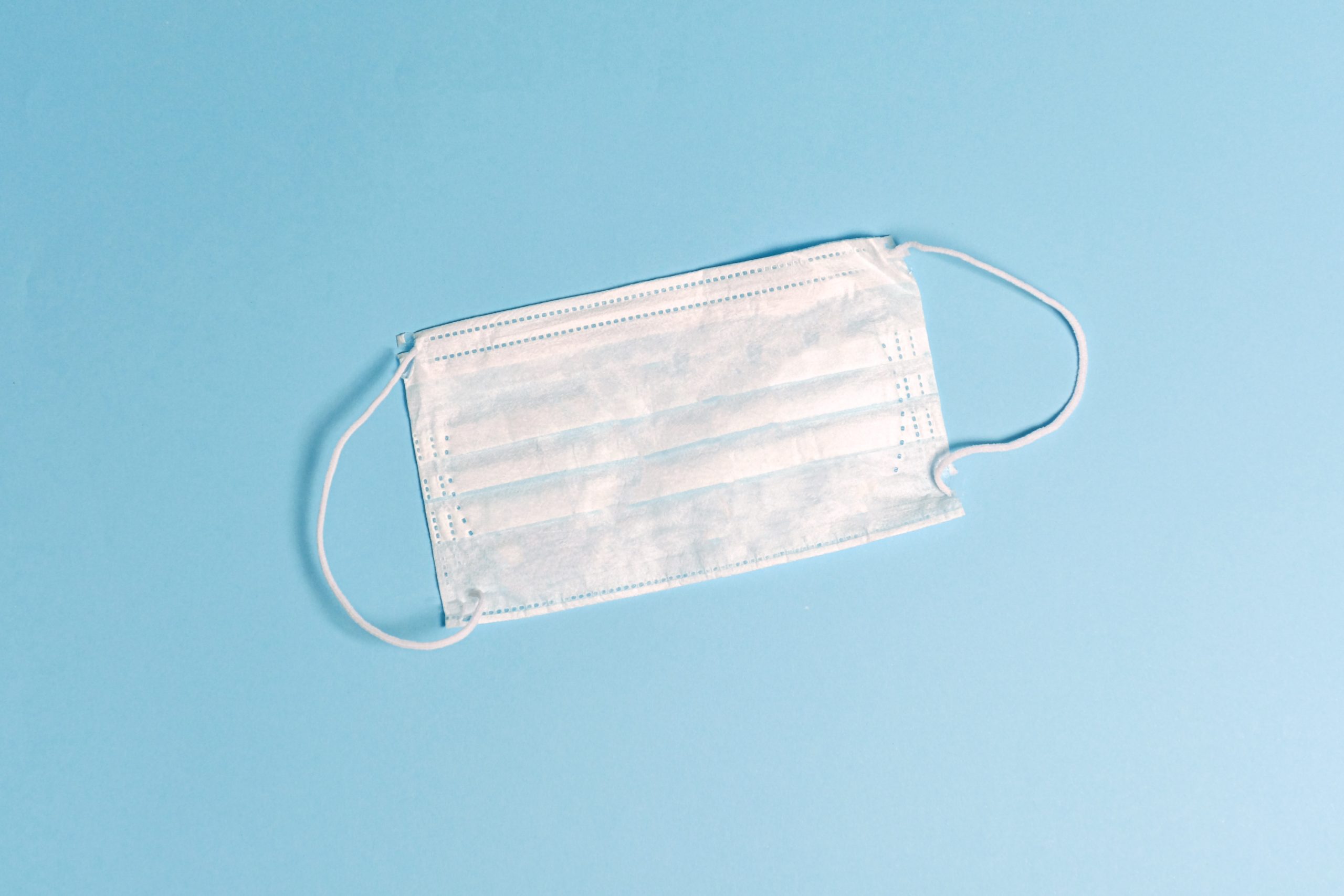
COVID-19 Rapid Assessment
The CDPE is leading a rapid assessment of the COVID-19 pandemic’s impact on people who inject drugs in Toronto.
View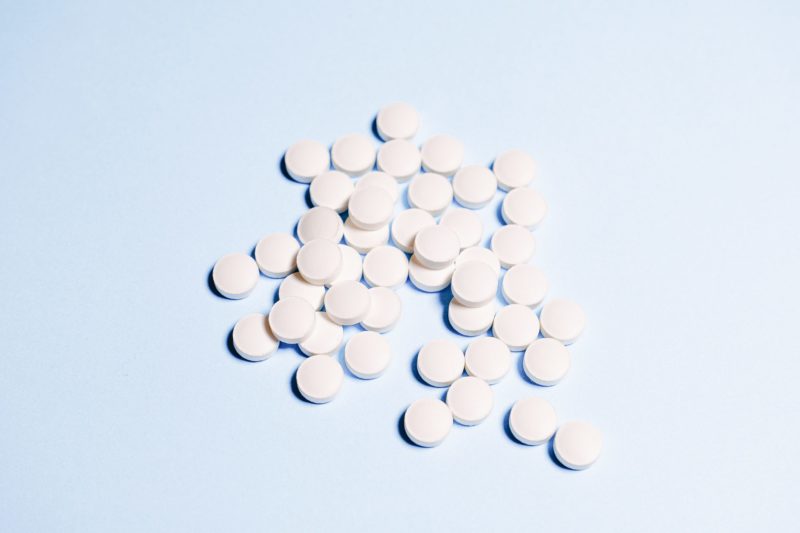
Safer Opioid Supply Programs Evaluation in Toronto, Ontario
The CDPE is leading a study to evaluate the impact of safer opioid supply programs in Toronto, Ontario.
View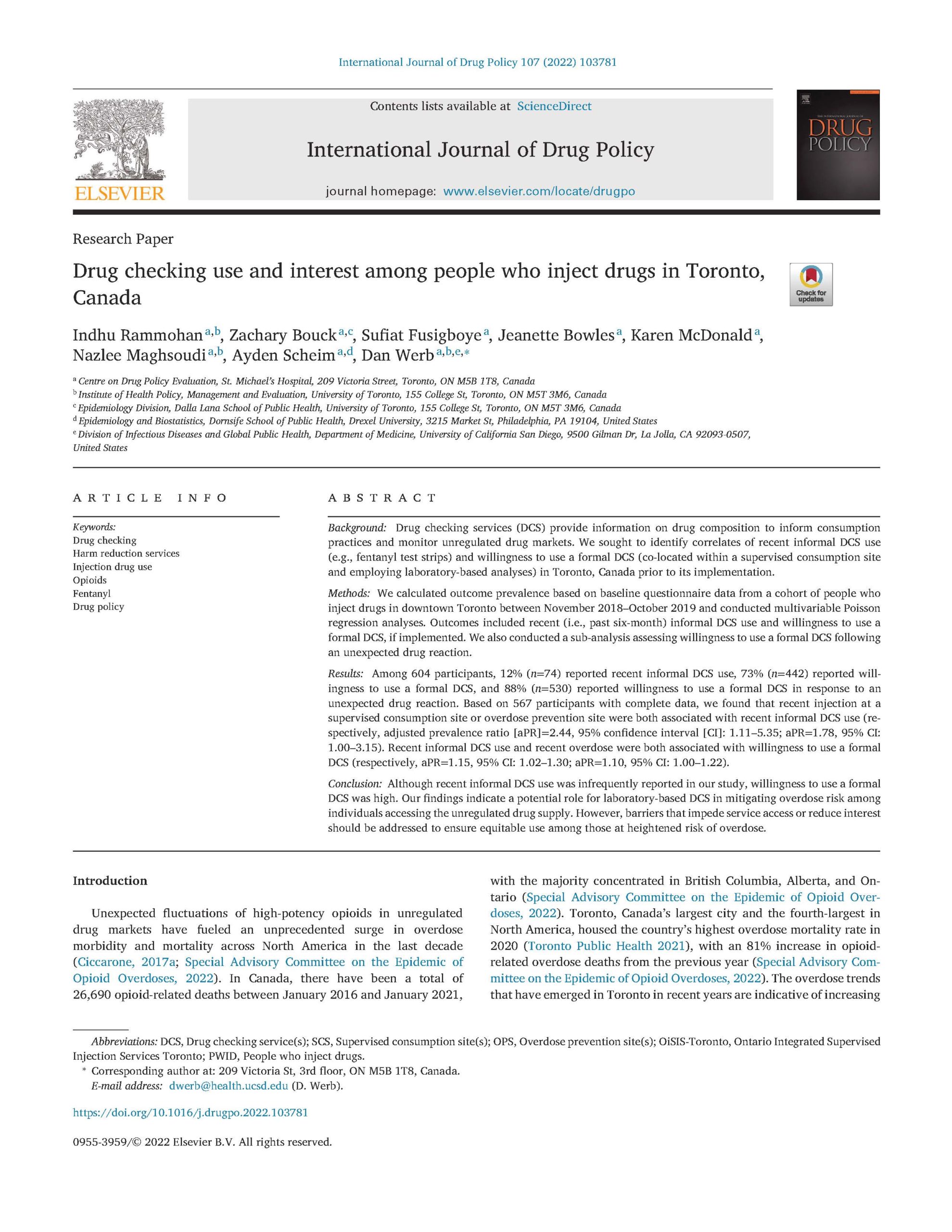
Drug checking use and interest among people who inject drugs in Toronto, Canada
Drug checking services (DCS) provide information on drug composition to inform consumption practices and monitor unregulated drug markets. We sought to identify correlates of recent informal DCS use (e.g., fentanyl test strips) and willingness to use a formal DCS (co-located within a supervised consumption site and employing laboratory-based analyses) in Toronto, Canada prior to its implementation.
View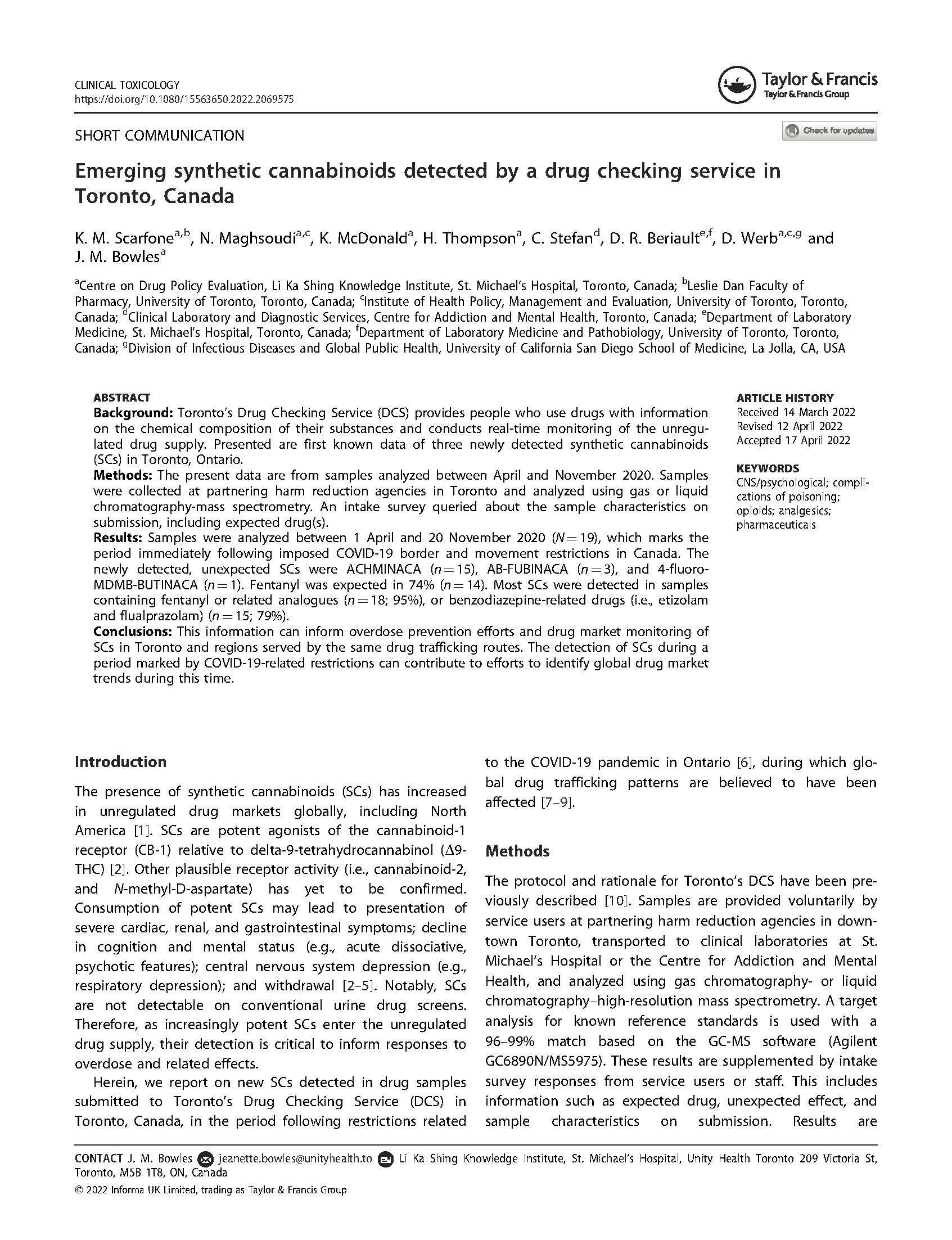
Emerging synthetic cannabinoids detected by a drug checking service in Toronto, Canada
This article reports on new synthetic cannabinoids (SCs) detected in drug samples submitted to Toronto’s Drug Checking Service (DCS) in Toronto, Canada, in the period following restrictions related to the COVID-19 pandemic in Ontario, during which global drug trafficking patterns are believed to have been affected.
View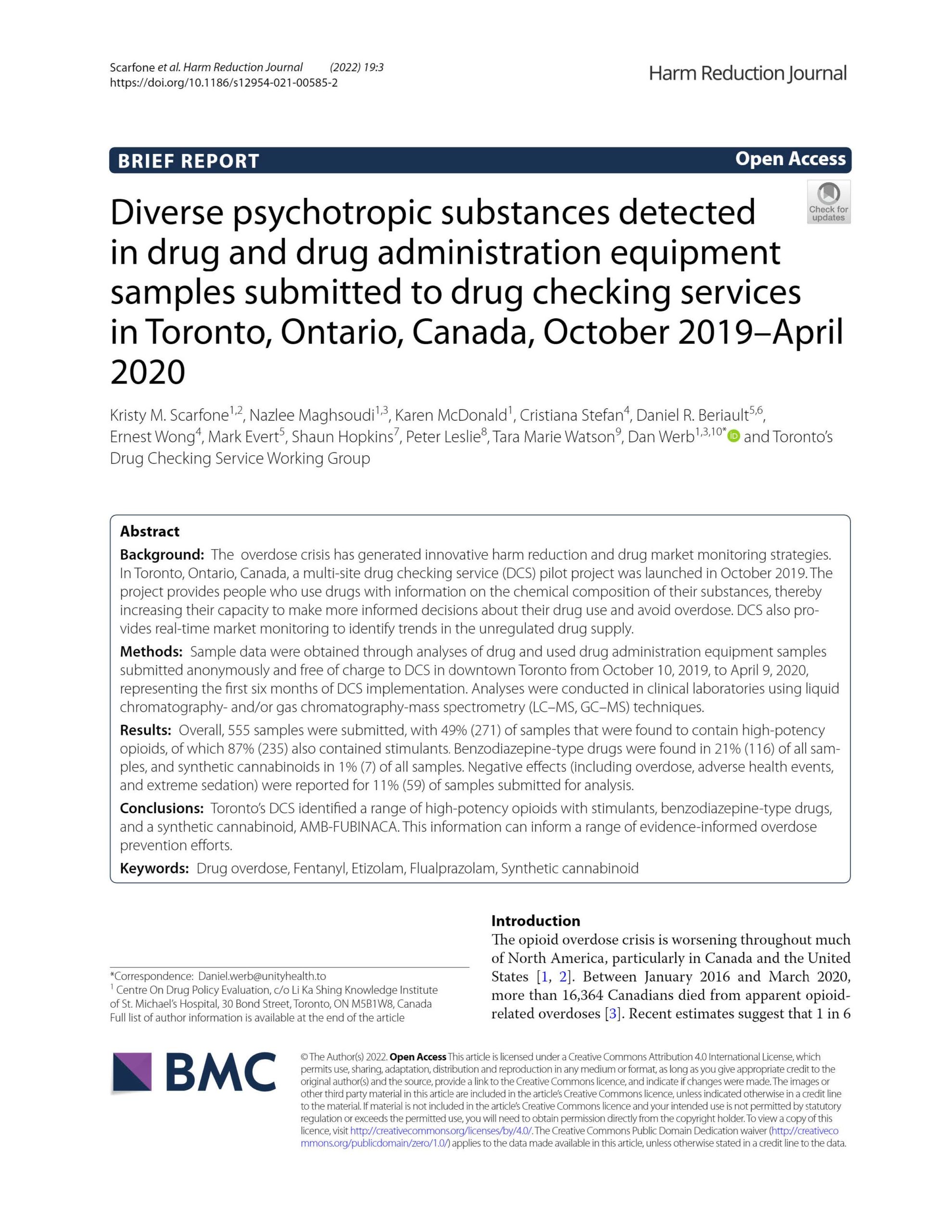
Diverse psychotropic substances detected in drug and drug administration equipment samples submitted to drug checking services in Toronto, Ontario, Canada, October 2019–April 2020
This report presents early trends of samples analyzed within the first six months of drug checking service implementation in Toronto, Ontario. We sought to identify the prevalence of high-potency opioids in the unregulated drug supply and to identify noteworthy combinations thereof with stimulants, benzodiazepine-type drugs, and synthetic cannabinoids. We also present data on reported negative effects of samples (e.g., overdose).
View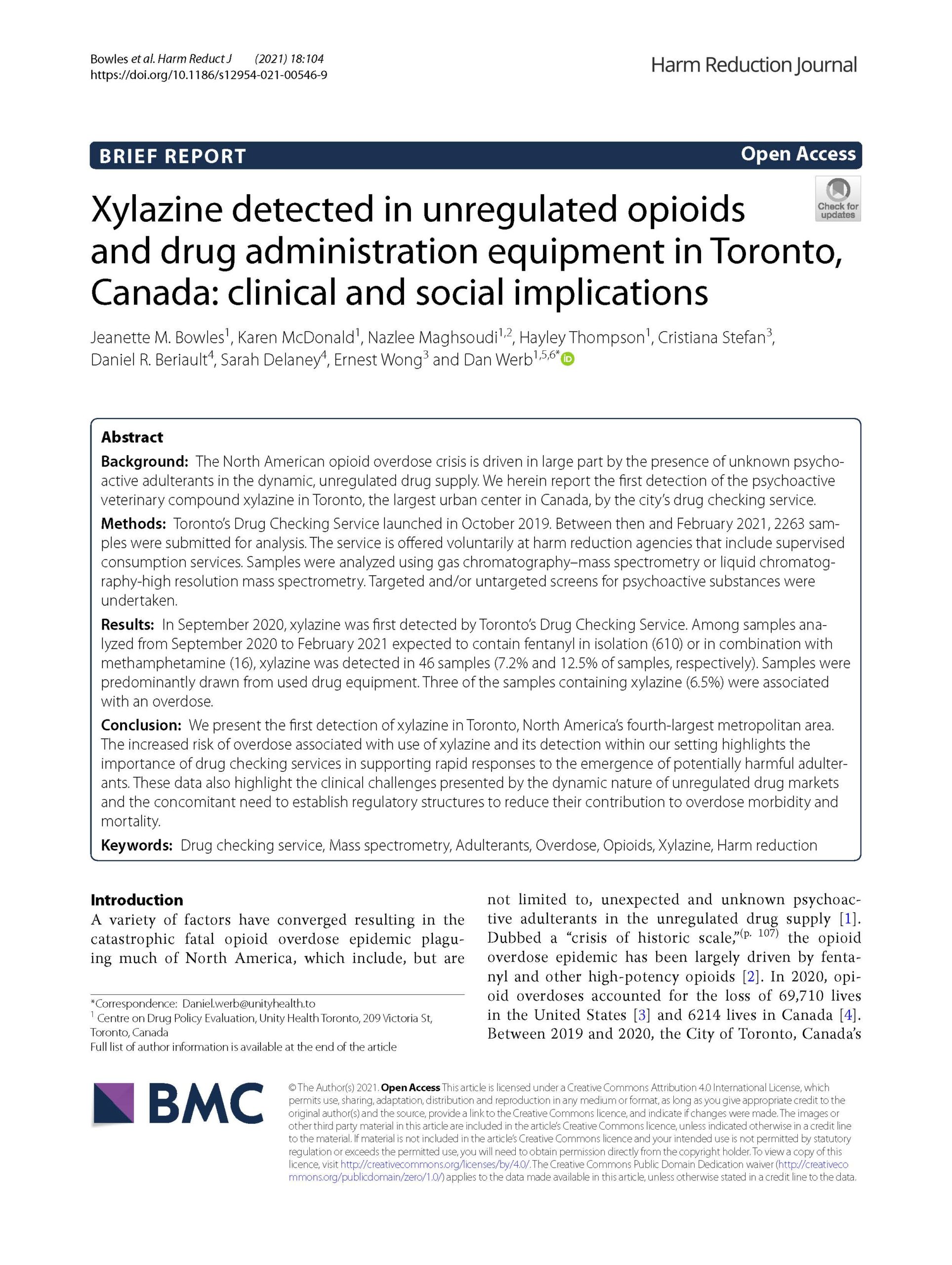
Xylazine detected in unregulated opioids and drug administration equipment in Toronto, Canada: clinical and social implications
We report the first detection of the psychoactive veterinary compound xylazine in Toronto, the largest urban center in Canada, by the city’s drug checking service.
View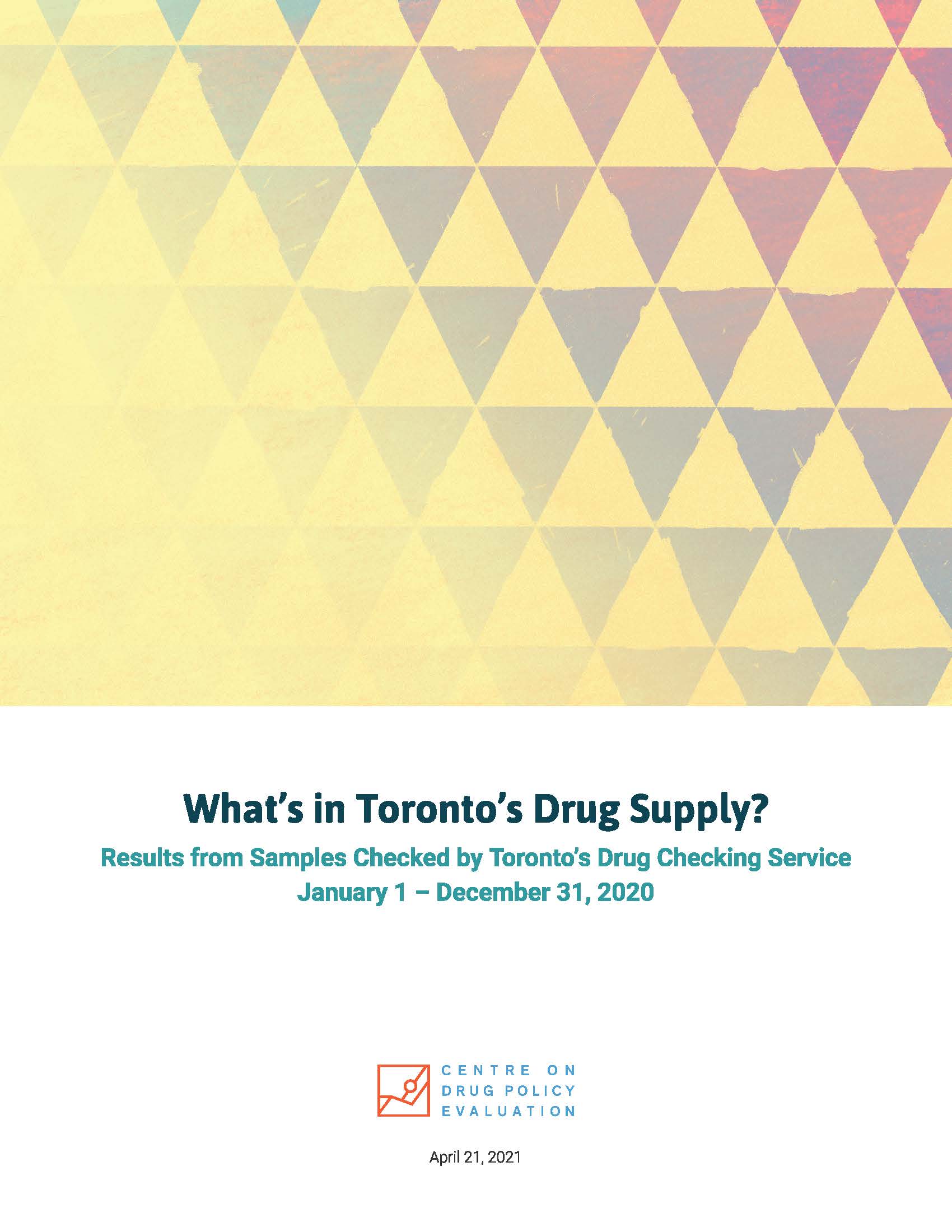
What’s in Toronto’s drug supply? Results from samples checked by Toronto’s drug checking service: January 1 – December 31, 2020
Between January 1 and December 31, 2020, 1657 samples were checked using mass spectrometry technologies (gas- and liquid-chromatography). This report details the results from the analysis of those samples.
View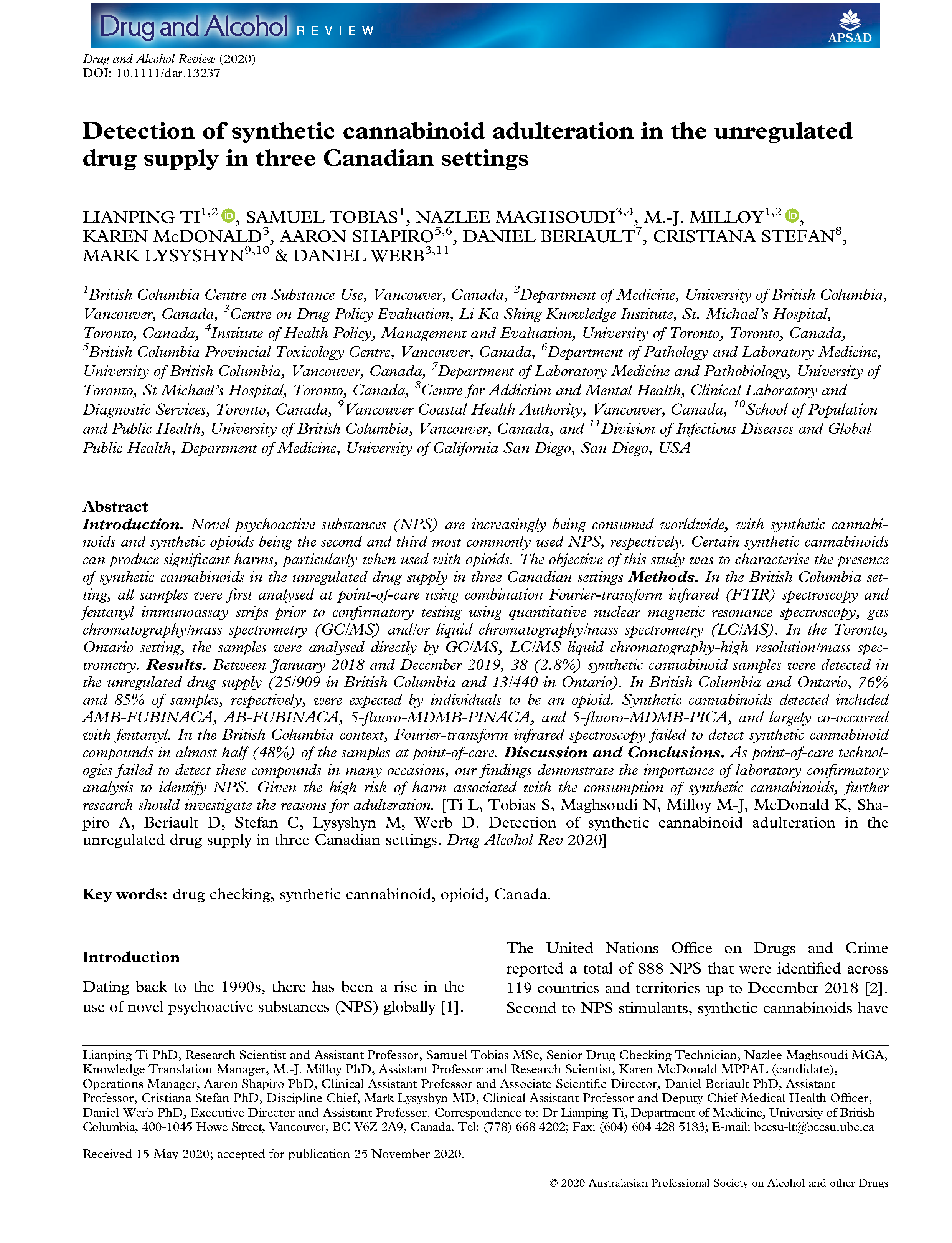
Detection of Synthetic Cannabinoid Adulteration in the Unregulated Drug Supply in three Canadian Settings
The objective of this study was to characterise the presence of synthetic cannabinoids in the unregulated drug supply in three Canadian settings.
View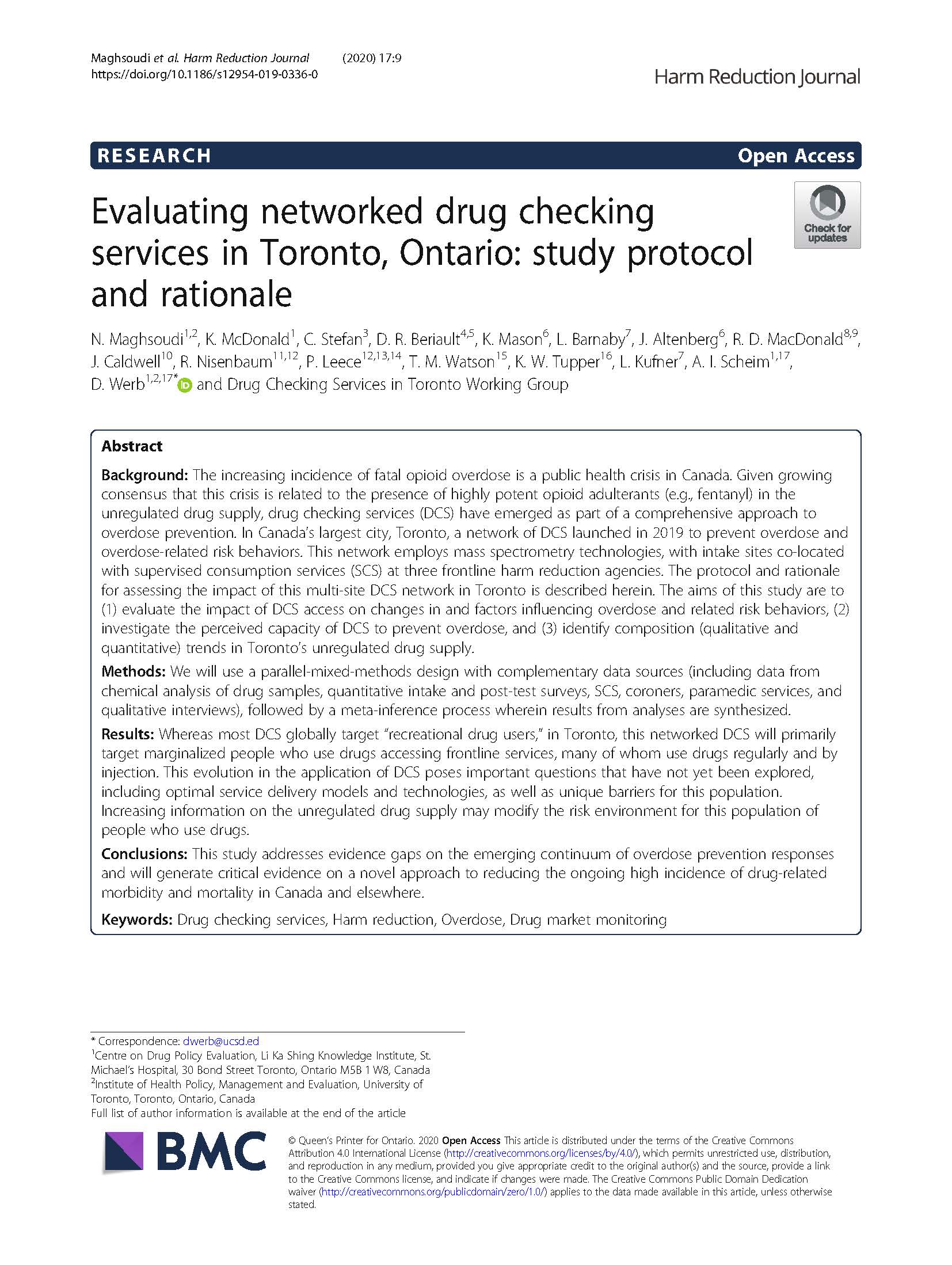
Evaluating Networked Drug Checking Services in Toronto, Ontario: Study Protocol and Rationale
As a harm reduction intervention available in Europe since the 1990s, DCS provide information on the composition of drugs to their clients in order to facilitate more informed drug-related decision-making and to increase the capacity of individuals to avoid ingesting unanticipated toxic substances, which can lead to overdose and death.
View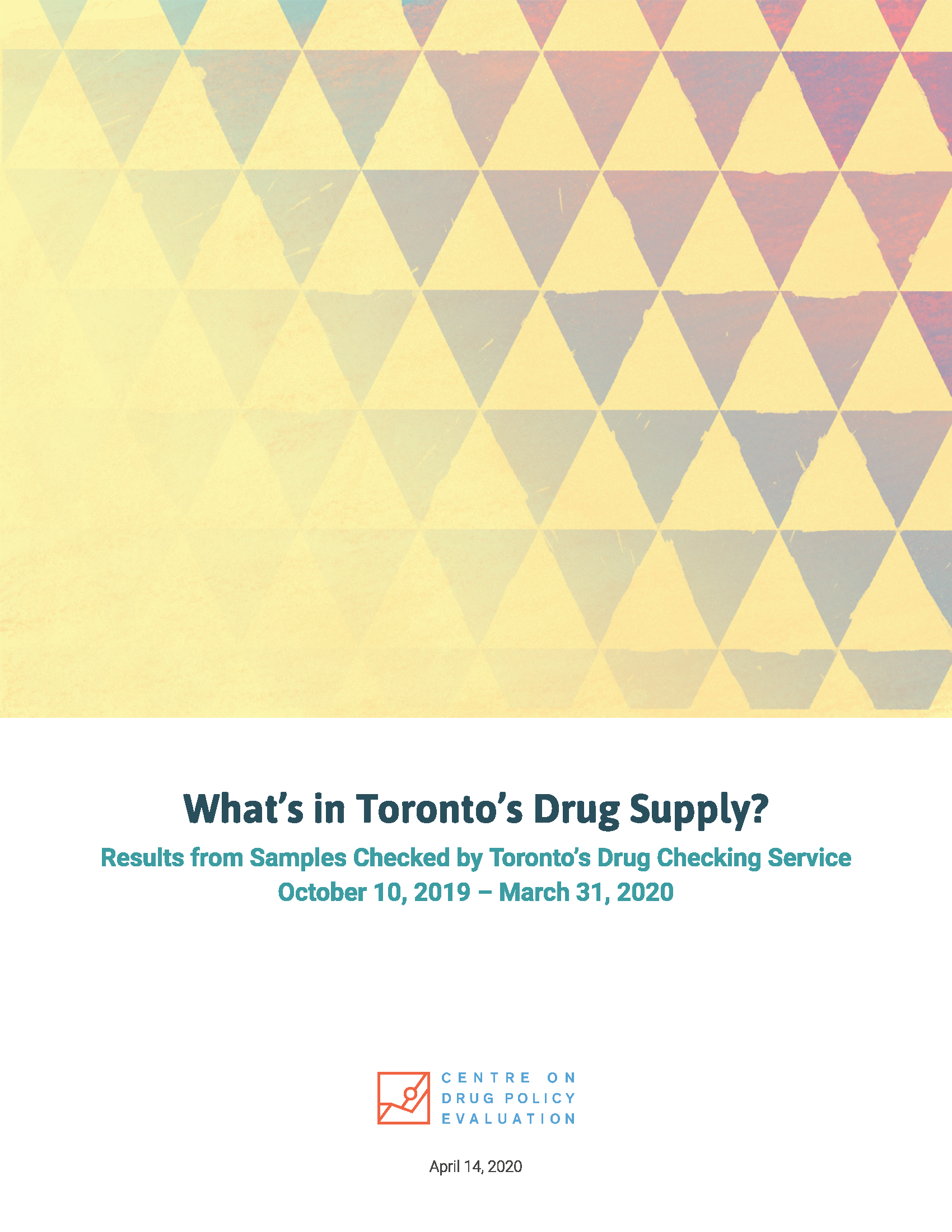
What’s in Toronto’s Drug Supply?
Results from samples checked by Toronto's drug checking service between October 10, 2019 - March 31, 2020.
View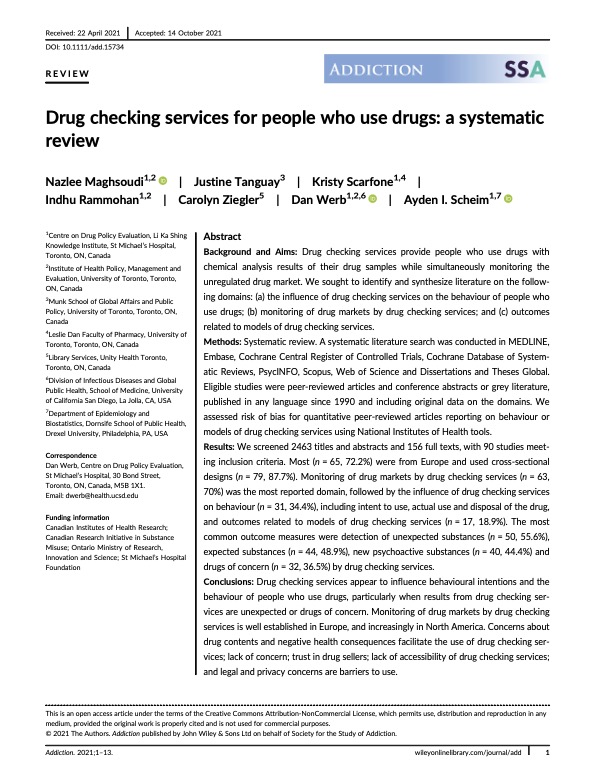
Drug Checking Services for People Who Use Drugs: A Systematic Review
Given the growing availability of drug checking services and interest in their impacts, we conducted a systematic review to investigate the (a) influence of drug checking services on behaviour of people who use drugs, (b) monitoring of drug markets by drug checking services, and (c) outcomes related to models of drug checking services.
View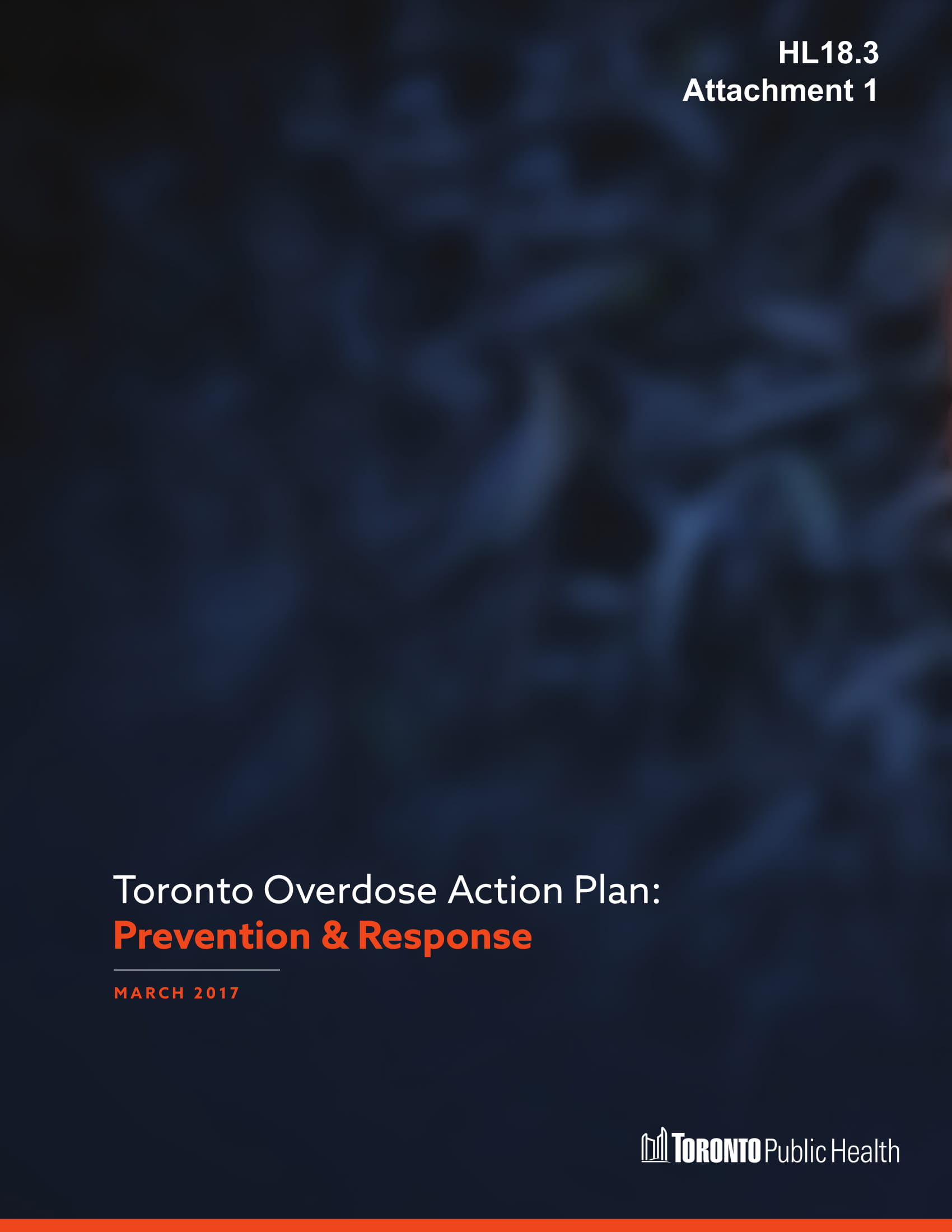
Toronto Overdose Action Plan: Prevention and Response
Read the Toronto Overdose Action Plan, endorsed by the Board of Health and calling for the implementation of drug checking at supervised injection sites and alongside harm reduction programming at music events.
View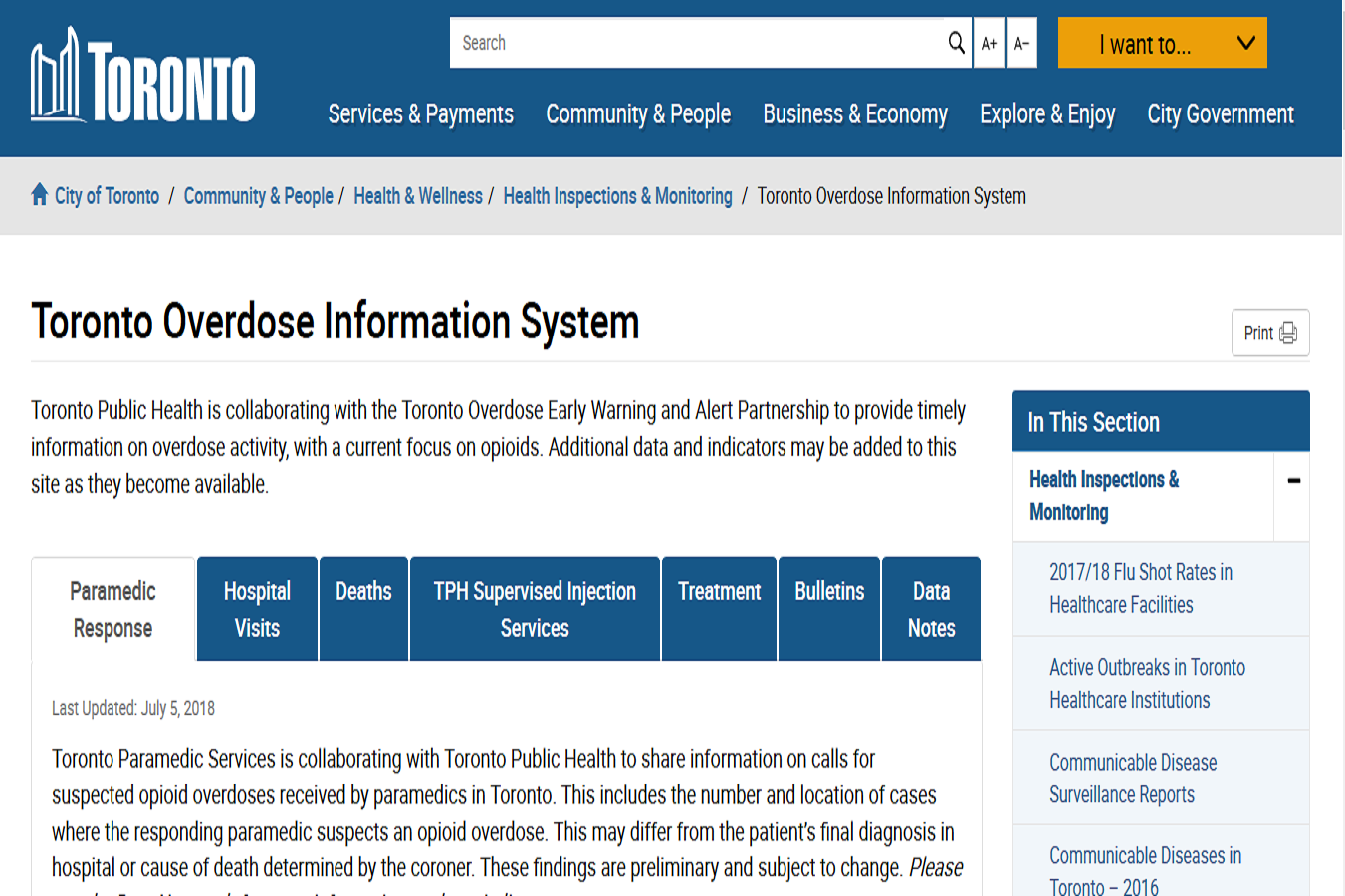
Toronto Overdose Information System
View the Toronto Public Health and Toronto Overdose Early Warning and Alert Partnership database on overdose activity in Toronto, with a current focus on opioids.
View